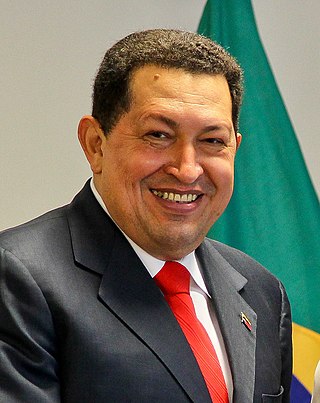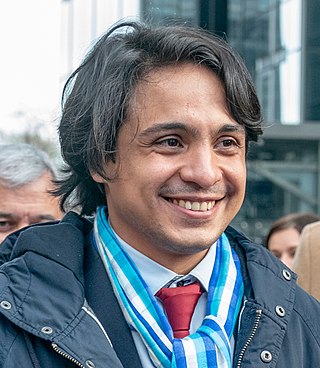Related Research Articles

The economy of Venezuela is based primarily on petroleum. Venezuela is the 25th largest producer of oil in the world and the 8th largest member of OPEC. Venezuela also manufactures and exports heavy industry products such as steel, aluminum, and cement. Other notable manufacturing includes electronics and automobiles as well as beverages and foodstuffs. Agriculture in Venezuela accounts for approximately 4.7% of GDP, 7.3% of the labor force and at least one-fourth of Venezuela's land area. Venezuela exports rice, corn, fish, tropical fruit, coffee, pork and beef. Venezuela has an estimated US$14.3 trillion worth of natural resources and is not self-sufficient in most areas of agriculture. Exports accounted for 16.7% of GDP and petroleum products accounted for about 95% of those exports.

Hugo Rafael Chávez Frías was a Venezuelan politician and military officer who served as president of Venezuela from 1999 until his death in 2013, except for a brief period of forty-seven hours in 2002. Chávez was also leader of the Fifth Republic Movement political party from its foundation in 1997 until 2007, when it merged with several other parties to form the United Socialist Party of Venezuela (PSUV), which he led until 2012.
The bolívar is the official currency of Venezuela. Named after the hero of South American independence Simón Bolívar, it was introduced following the monetary reform in 1879, before which the venezolano was circulating. Due to its decades-long reliance on silver and gold standards, and then on a peg to the United States dollar, it was considered among the most stable currencies and was internationally accepted until 1964, when the government decided to adopt a floating exchange rate instead.

Carlos Andrés Pérez Rodríguez also known as CAP and often referred to as El Gocho, was a Venezuelan politician and the president of Venezuela from 12 March 1974 to 12 March 1979 and again from 2 February 1989 to 21 May 1993. He was one of the founders of Acción Democrática, the dominant political party in Venezuela during the second half of the twentieth century.

Leopoldo Eduardo López Mendoza is a Venezuelan opposition leader. He co-founded the political party Primero Justicia in 2000 with Julio Borges. López was elected mayor of the Chacao Municipality of Caracas in the regional elections held in July 2000. He is the National Coordinator of another political party, Voluntad Popular, which he founded in 2009.

Jorge Jesús Rodríguez Gómez is a Venezuelan politician and psychiatrist serving as President of the National Assembly of Venezuela since 2021. He previously served as the vice president of Venezuela from 2007 to 2008 and as Mayor of the Libertador Bolivarian Municipality from 2009 to 2017. He is the brother of Delcy Rodríguez, the current vice president.

The Bank of the South or BancoSur is a monetary fund and lending organization established on 26 September 2009 by Argentina, Brazil, Paraguay, Uruguay, Ecuador, Bolivia and Venezuela with promises of initial capital of US$20 billion. Argentina, Venezuela, and Brazil were to have each pledged $4 billion, and Uruguay, Ecuador, Paraguay and Bolivia were to have contributed smaller amounts. The bank intended to lend money to nations in the Americas to construct social programs and infrastructure. Documents establishing the bank as an entity were signed in 2007, and the agreement between the countries was finalized in 2009, but as of 2016, the bank had not been capitalized.

The Maletinazo, Valijagate, or suitcase scandal was a 2007 scandal involving Venezuela and Argentina, souring friendship between the countries.
Bolibourgeoisie or Bolichicos are terms describing the new bourgeois created by the Venezuelan government of Hugo Chávez and Chavismo, made up of people who became rich under the Chávez administration. The term was coined by journalist Juan Carlos Zapata to "define the oligarchy that has developed under the protection of the Chávez government".

Yon Alexander Goicoechea Lara is a Venezuelan lawyer, activist and organizer. He emerged as one of the leaders behind the Venezuelan Student Movement, which formed as a result of actions by Hugo Chávez to amass further power as the country's president. He holds degrees from the Andrés Bello Catholic University and Columbia University.

Antonio José Ledezma Díaz is a Venezuelan lawyer, opposition politician and former political prisoner. After unsuccessfully challenging for the leadership of Democratic Action in 1999, he founded a new party, the Fearless People's Alliance.

Banco de Venezuela is an international universal bank based in Caracas. It was the market leader in Venezuela until 2007, when it fell to third place, with an 11.3% market share for deposits; its major competitors are Banesco, Banco Mercantil and BBVA Banco Provincial. As of June 2008, it had 285 branches in Venezuela.

From his election in 1998 until his death in March 2013, the administration of the late Venezuelan President Hugo Chávez proposed and enacted populist economic policies as part of his Bolivarian Revolution.

The record of human rights in Venezuela has been criticized by human rights organizations such as Human Rights Watch and Amnesty International. Concerns include attacks against journalists, political persecution, harassment of human rights defenders, poor prison conditions, torture, extrajudicial executions by death squads, and forced disappearances.

Guillermo Tell Villegas Pulido, was a Venezuelan lawyer, writer, journalist, and politician who served as acting president of Venezuela. A lawyer early in his career, in 1876 he cofounded the school La Paz in Caracas. Also dedicated to journalism, he founded the publications Alianza Literaria in 1876, La Mayoría in 1879, and Monitor in 1889. Between 1879 and 1892 he held various political roles including Secretary of Interior of the Federal District, secretary general in the government of President Antonio Guzmán Blanco, and a trial judge in Caracas.
María Lourdes Afiuni Mora is a Venezuelan judge. She was head of the 31st Control Court of Caracas before she was arrested in 2009 on charges of corruption after ordering the conditional release on bail of businessman Eligio Cedeño, who then fled the country. She was moved to house arrest in Caracas in February 2011, and granted parole in June 2013, but she is still barred from practicing law, leaving the country, or using her bank account or social networks.
Amauris Samartino Flores is a Cuban physician who escaped from his native country in 1999 in a makeshift raft. He was given asylum in Bolivia, but after becoming politically active in that country, protesting the governments of both Fidel Castro and Evo Morales, was deported. He now lives in Norway.
Iván Antonio Simonovis Aranguren is a Venezuelan criminal science expert and security consultant, who served as security chief during the Llaguno Overpass events of April 2002 in Caracas.
Susana Virginia Barreiros Rodríguez is a Venezuelan judge, most notable for leading the case and sentencing against the opposition leader Leopoldo López. She was provisionally designated as Public Defender of Venezuela in 2015, until her resignation, which saw the role being given to Carmen Marisela Castro on 8 January 2019.

Lorent Enrique Gómez Saleh is a Venezuelan activist. Since 2011, Saleh has participated in several activities in defense of human rights and has been repeatedly detained by the Venezuelan authorities. In 2014, he was deported from Colombia and handed over to officials of the Bolivarian Intelligence Service (SEBIN). Until 2018, he was being held in La Tumba, in Plaza Venezuela, Caracas, during which time his hearing had been postponed 52 times. On 12 October 2018, he was released by the Venezuelan authorities and exiled to Spain, where he arrived the next day after landing at the Madrid–Barajas Airport.
References
- 1 2 3 "Cedeno Trial Postponed for Fourth Time in a Month". Reuters. 19 March 2008. Archived from the original on 3 July 2012.
- ↑ "Prominent Venezuelan Business Leader, Eligio Cedeno, Denied Right to Fair Trial, Again". Reuters. 13 March 2008. Archived from the original on 29 August 2008.
- 1 2 "Venezuelan bank president detained in crack down on illegal dollar transactions". International Herald Tribune. 8 February 2007. Archived from the original on 2 April 2007.
- 1 2 The Guardian , 17 December 2009, UN human rights panel accuses Chávez of undermining Venezuelan judges
- ↑ "Banco Canarias to acquire Banco Bolivar - Venezuela". The America's Intelligence Wire. 17 June 2004.
- ↑ "Interpol captura en Panamá a Gustavo Arraíz imputado por caso Microstar". UnionRadio.net. 1 March 2007. Archived from the original on 7 May 2008.
- ↑ "Fiscalía realizó nueva acusación por caso Microstar". Venevision.com. 26 March 2007. Archived from the original on 7 May 2008.
- ↑ "Detienen en Panamá a solicitado por caso Microstar". El Universal. 5 March 2007. Archived from the original on 6 May 2008.
- 1 2 "U.S. Grants Asylum to Chavez Opponent". The Wall Street Journal . 19 May 2011.
- 1 2 "Bolivarian rule of lawlesness". Robertamsterdam.com. Archived from the original on 31 December 2013. Retrieved 31 December 2013.
- ↑ "Venezuelan President Hugo Chavez Abuses Extradition Treaties, Says Lawyer". Prnewswire.com. 29 December 2009. Retrieved 31 December 2013.
- ↑ "UPDATE: Venezuelan Banker, Wanted Back Home, Is Paroled in US". The Wall Street Journal . 23 December 2009.[ dead link ]